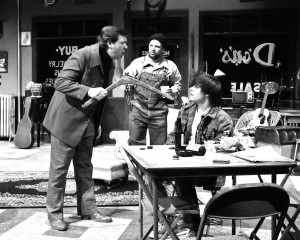Montage editor reviews Meramec play “American Buffalo”
By: Jacob Hight

-Graphics Editor-
It is a rare thing to see audience members walk across the stage during a theatrical production, but that’s exactly what happened April 1, and it was no joke.
From March 31 to April 4 STLCC-Meramec “by special arrangements with Samuel French” presented David Mamet’s “American Buffalo,” under Keith Oliver’s direction. The play is about a pawnshop owner’s plans to steal a rare buffalo nickel, aided by his young protégé and his own mentor. The production was for “Mature Audiences only,” no doubt due to the violence and four-letter language. The programs clearly stated, “There will be no late seating for this production,” though, the evening did not proceed according to planned, in more ways than one.
Upon entry into the theatre, patrons saw that the scene was inverted, the set facing inward towards the back of the stage, the audience seated at the back of the stage behind the magnificently detailed pawnshop set. This novel seating arrangement had the potential to play a significant role in the experience of the play, especially capturing and focusing the tension of the second act. It was a brilliant and exciting experiment, that wasn’t allowed to succeed.
Despite the warning on the program, during the first 15 minutes of the April 1 performance, latecomers were allowed in. This was a devastating distraction, as the stragglers were literally wandering on the set searching for a seat (the actors took it in stride and stayed in the moment). The exposition of the play was virtually obliterated, and the innovative seating remained a subtle distraction during the remainder of the evening for at least one audience member.
Even more distracting than the seating was Jeff Kramer’s performance of Walter Cole (“Teach”), the pawnshop owner’s mentor. Kramer’s portrayal of Cole was convincing, powerful and provocative, fully invoking the character with his voice and body. Tragically, his vivid performance was continually punctuated by self-correcting paraphrased lines, even single words.
Cole’s partner in crime and owner of the pawnshop, Donny Dubow, was played by David Harleman. Harleman’s performance of Dubow was very clear and focused, but was almost overly sympathetic. Dubow’s warmth and concern shown toward Bobby (played by Stephen Henley), though refreshing, was practically maternal and on full-strength from beginning to end, giving his character nowhere to grow. Some of Dubow’s dialogue in the second act actually seemed out of character for the degree of compassion Harleman imbued the character with.
The production was given purpose and substance by Stephen Henley’s exquisitely human performance of Bobby, a young man who’s fallen in with Dubow. Without Henley’s completely committed, prepared and insightful performance in the second act, the theme and humanity of the play would have been completely lost, rendering it an ultimately gratuitous exhibition of unkindness.
“American Buffalo” is a powerful reminder of how precious free speech is and how powerful art remains.











